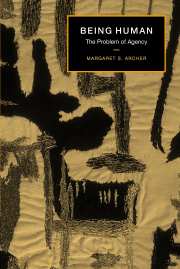Book contents
- Frontmatter
- Contents
- List of figures
- Acknowledgements
- Introduction
- Part I The impoverishment of humanity
- Part II The emergence of self-consciousness
- Part III The emergence of personal identity
- Part IV The emergence of social identity
- 8 Agents: active and passive
- 9 Actors and commitment
- Conclusion: the re-emergence of humanity
- Index
8 - Agents: active and passive
Published online by Cambridge University Press: 22 September 2009
- Frontmatter
- Contents
- List of figures
- Acknowledgements
- Introduction
- Part I The impoverishment of humanity
- Part II The emergence of self-consciousness
- Part III The emergence of personal identity
- Part IV The emergence of social identity
- 8 Agents: active and passive
- 9 Actors and commitment
- Conclusion: the re-emergence of humanity
- Index
Summary
It is doubtful if anyone would dispute the fact that human beings are intrinsically social animals. Logically, however, nothing can be deduced from that concerning the role which society plays in making us what we are. Sociologically, this book represents an extended critique of two approaches which are diametrically opposed to one another about the part played by sociality in our constitution. On the one hand, protagonists of ‘Modernity's Man’ would basically answer that society contributed ‘nothing’ to our making: on the contrary, it is that pre-formed and atomistic being who, along with others like him, generates the entirety of the social structure from his built-in disposition to be a rational actor. On the other hand, advocates of ‘Society's Being’ would basically answer that society contributed ‘everything’ to our making: since this view contains no human beings as such but only social agents, formed from ‘indeterminate material’, who energise the social system after appropriate socialisation. Equally basically, the position taken here is that society does indeed contribute ‘something’ rather than ‘nothing’ to making us what we are, but that this ‘something’ falls a good deal short of that ‘everything’, which would make all that we are a gift of society.
The last two sections of this book, which dealt with the emergence of self-consciousness and of personal identity, can be read as attacks upon the overly-social nature of ‘Society's Being’ and the overly-individual nature of ‘Modernity's Man’. These critiques were symmetrical because in both cases it was maintained that their deficiencies sprang from the failure to acknowledge the impact of all three orders of reality upon our human development.
- Type
- Chapter
- Information
- Being HumanThe Problem of Agency, pp. 253 - 282Publisher: Cambridge University PressPrint publication year: 2000



